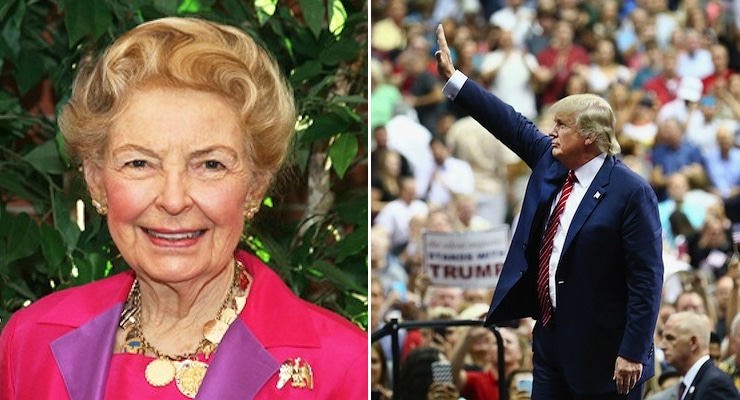

Conservative icon Phyllis-Schlafly, left, endorsed Republican presidential candidate Donald Trump, right, who is seen here greeting supporters during a campaign rally at the American Airlines Center on September 14, 2015 in Dallas, Texas. More than 20,000 tickets had been distributed for the event. (Photo: Tom Pennington/Getty Images)
In 1964, Phyllis Schlafly of Alton, Illinois, mother of six, wrote and published a slim volume entitled “A Choice Not an Echo.”
Backing the candidacy of Sen. Barry Goldwater, the book was a polemic against the stranglehold the eastern liberal establishment had held on the Republican nomination for decades.
Schlafly went on to lead the campaign to derail the Equal Rights Amendment, which, with 35 states having ratified, was just three states short of being added to our Constitution.
Pro-ERA forces never added another state. Phyllis, who, at 20 was testing weapons at a munitions plant in World War II, shot it dead.
At 92, the founder of Eagle Forum has a new book out, published by Regnery. “The Conservative Case for Trump,” co-authored by Ed Martin of Eagle Forum and Brett Decker, argues that the Donald is an authentic conservative around whom every conservative should rally.
Yet, in making their cogent case, Schlafly and her co-authors raise questions that today bedevil the movement.
What does conservatism mean in 2016? Upon what ideas and issues, principles and policies, do conservatives still agree?
“In my father’s house there are many mansions,” the Bible tells us. So it is in the house divided that is the American Right.
Each of the chapters in “The Conservative Case for Trump” is devoted to Donald Trump’s stand on a major issue of the campaign. And on most of the issues selected, almost all conservatives agree.
Trump believes Antonin Scalia is the gold standard for Supreme Court justices and federal judges, and that among the indispensable cures for decrepit and failing public schools is competition from private, religious and charter schools.
A businessman and builder, Trump has confronted the onus of federal overregulation that stifles enterprise and kills jobs. With most conservatives, he believes in a U.S. military second to none.
Some Republicans, however, part with Trump on his contempt for political correctness, his refusal to observe strictures on debate laid down by our ruling elites, and his rejection of their claims to moral authority with his airy dismissals of their demands for apologies.
Part of Trump’s populist appeal is that, by his rebellious stand, he appears to challenge the very legitimacy of the regime. Thus those most disgusted with the establishment cheer him loudest.
On immigration, Trump shares the alarm of a Middle America that sees its country being irretrievably altered by an invasion from across our border. He has no hesitancy in urging tough methods to secure the borders and send back those who disrespect our laws.
This offends the sensibilities of many Republicans. And, indeed, it contradicts a core dogma of the “conservatism” preached at The Wall Street Journal.
Years ago, when some of us first took up the border crisis, the Journal, under editorial page editor Robert Bartley, called for a new five-word constitutional amendment — “There shall be open borders.”
The Journal anticipated John Kerry who just told the graduating class at Northeastern University, “You are about to graduate into … a borderless world.” Is John Kerry a Wall Street Journal conservative?
Chapter two of Schafly’s book deals with Trump’s stance on the trade deals of recent decades — NAFTA, MFN for China, the South Korea deal and, the daddy of them all, the TPP.
Chapter title: “Rotten trade Deals.” Yet, all of these trade deals had the support of the Party of Bush I and Bush II.
Trump has spoken out against crusades for democracy, nation-building abroad and unnecessary wars — especially Iraq in 2003.
And what was the official “conservative” stand on Iraq in 2003?
William F. Buckley’s National Review attacked the libertarian and traditionalist right that opposed invading Iraq on such flimsy pretexts as — “unpatriotic conservatives” who “hate their country.”
“This is a binary election,” John Bolton is quoted in Phyllis’ book. “[N]ot voting” for Trump is “functionally … a vote for Hillary.”
Yet that is where some conservative and neocon columnists and scores of foreign policy veterans of the GOP, and ex-Presidents Bush I and II, and 2012 GOP candidate Mitt Romney are heading.
Three of Trump’s rivals for the nomination — Ted Cruz, Jeb Bush and John Kasich — who held up their hand and pledged to support the nominee, appear about to dishonor their pledge.
But what is conservative about rendering aid and comfort to the presidential ambitions of Hillary Rodham Clinton?
As for the issues on where the right is split, interventionism is born of Wilson and FDR; noninterventionism is of Taft, Ike and Reagan.
Free trade as dogma comes out of the Party of Wilson and FDR, not the Party of Lincoln and Teddy Roosevelt.
Ike sent a general to secure the border and send illegal immigrants home. Yet self-described conservatives like the Bushes and McCains join hands with the Clintons and Obamas to call for amnesty.
“The Conservative Case for Trump” is a splendid little book by the first lady of American Conservatism.
The Hillarycons now owe it to us to make their case.






